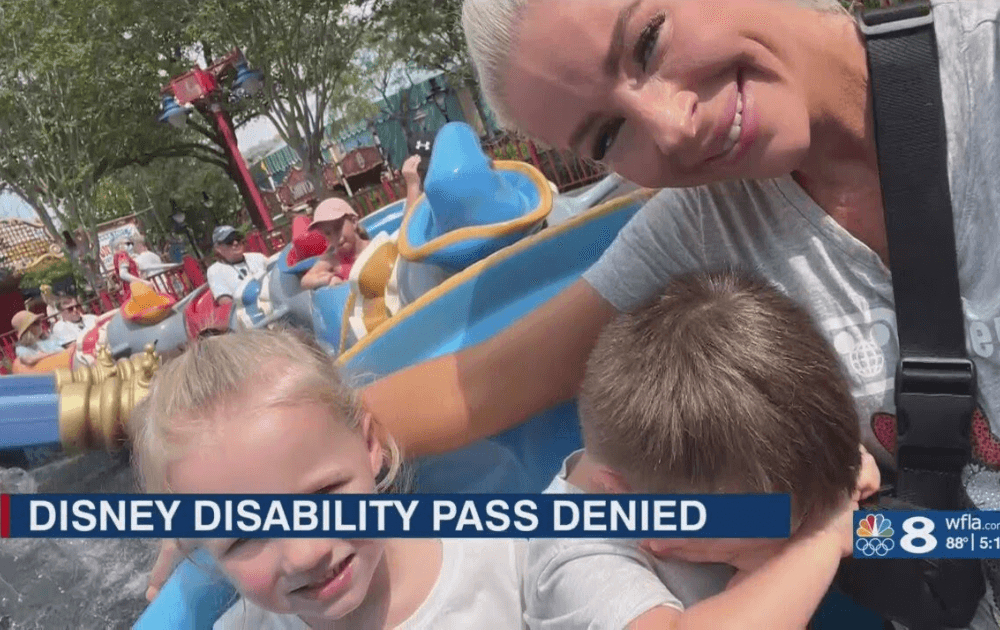Disney World is famously known as the “happiest place on earth,” offering a magical experience for millions of visitors each year. However, for one Tampa Bay, Florida, family, the magic seems to have disappeared after they struggled to get the disability accommodations they need for their son. This change has sparked concern and frustration, highlighting the challenges some families face when navigating the theme park’s updated policies.
ToniLynn McElreath, a devoted annual Disney pass holder, has been enjoying the park with her 3-year-old twins for years. One of her children, Luke, has a feeding tube, which is a critical part of his medical needs. “One of the common things with this condition is or having a feeding tube is you vomit frequently, especially if you are overstimulated,” she said. For families with children who have medical conditions, Disney’s Disability Access Service (DAS) has historically provided an essential means of making their visit more manageable by accommodating their specific needs. Unfortunately, this year, the McElreath family encountered an unexpected challenge when they were denied access to the DAS pass during their visit.
Previously, the McElreaths had used the DAS pass to ensure their son received the necessary accommodations. This service allows families like the McElreaths to avoid long waits in lines, which can be difficult for children with special medical or developmental needs. However, when they renewed their request for the pass this year, they were turned down. “We went through the renewal process, and we were denied,” McElreath said. “So, I went for the first time yesterday and had to wait in the normal queue, and we were in line for Prince Charming’s Carousel, and Luke vomited.”
In a situation where the family had the DAS pass, they would have been able to plan their visit more carefully. The pass provides families with a designated time to arrive at the attraction, allowing them to better prepare their children for the experience. “We could make sure that he’s had a feed, and his stomach was empty for us to be able to get onto that ride,” McElreath said. “So that way, if he gets overstimulated and starts gagging, there’s nothing in his stomach to throw up.”
The recent changes to Disney’s Disability Access Service pass policies are designed to help manage demand, but they’ve left some families like the McElreaths feeling unsupported. Disney has stated that the DAS pass is meant for guests who have a developmental disability, such as autism, or a similar disorder that makes it challenging to wait in a conventional queue. “DAS is intended to accommodate only those Guests who, due to a developmental disability like autism or similar disorder, are unable to wait in a conventional queue for an extended period of time,” the company explains.
While McElreath understands the company’s desire to prevent abuse of the service, she feels the update to the policy is a step backward for families like hers. “I understand people take advantage of some of these programs,” she said. “We were ones who never took advantage.” As a result, the McElreaths are now left to navigate Disney World without the disability accommodations they once had, which affects the experience for Luke and the rest of the family.
For ToniLynn, the change in policy has not only created logistical difficulties but also made their once magical trips to the park far less enjoyable. “It’s sad that they’re almost taking the magic away from us,” she said, reflecting on the emotional impact of no longer being able to rely on the services that had made the experience more accessible for her son.
This change has prompted broader conversations about the importance of disability accommodations in public spaces like theme parks. Ensuring that families with children who have special needs have access to accommodations is essential for making experiences more inclusive and enjoyable for everyone. Disney’s decision to tighten the rules for DAS has left some families questioning whether the park is still as welcoming as it once was for all guests, regardless of their needs.
As the McElreaths and other families navigate these changes, it’s clear that access to essential services like disability accommodations can make all the difference in creating an inclusive, positive experience at Disney World. With families like the McElreaths continuing to voice their concerns, it will be interesting to see whether Disney revisits its policies to better support all guests, including those with medical or developmental challenges.
Discover Quality ABA Therapy with Golden Care Therapy
At Golden Care Therapy, we are committed to providing exceptional ABA therapy across multiple states.. Our team of highly trained and compassionate professionals works tirelessly to create personalized treatment plans that empower individuals with autism to reach their full potential. With a focus on creating meaningful progress, our ABA therapy services are designed to meet the unique needs of each client. Whether you’re seeking early intervention or ongoing support, Golden Care Therapy offers a wide range of services that cater to individuals of all ages. We take pride in providing family-centered care, ensuring that our clients and their loved ones feel supported every step of the way. If you are looking for comprehensive, evidence-based ABA therapy in Florida, New Jersey, Indiana, New York, or Georgia, reach out to us today. We’re here to help you create a brighter future for your family. Contact Golden Care Therapy to learn more about how our services can make a difference in your life.



